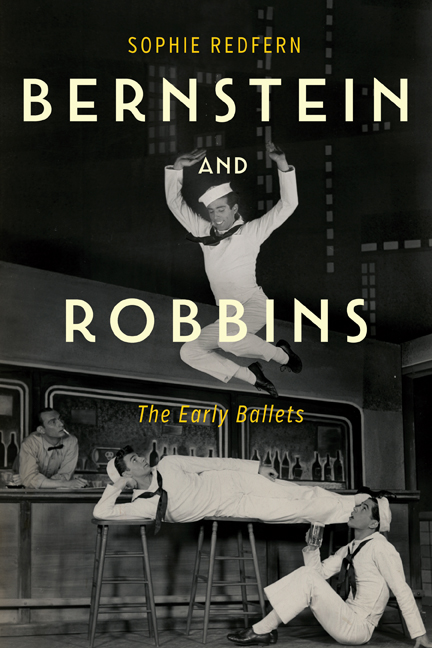Book contents
- Frontmatter
- Dedication
- Contents
- List of Illustrations
- Acknowledgments
- List of Abbreviations
- Editorial Note
- Preface
- 1 Setting the Scene: American Ballet and Jerome Robbins
- 2 Toward a First Ballet: Fancy Free Takes Shape
- 3 Creating Fancy Free: A Long-Distance Collaboration
- 4 The Music of Fancy Free: The Sketches and Score Explored
- 5 The Fancy Free Premiere and a Move to Broadway
- 6 Toward a Second Ballet: Bye Bye Jackie and the Creation of Facsimile
- 7 The Music of Facsimile: The Sketches and Score Explored
- 8 The Facsimile Premiere and Legacy of the Ballets
- Epilogue: Bernstein and Dance
- Bibliography
- Index
Epilogue: Bernstein and Dance
Published online by Cambridge University Press: 23 March 2021
- Frontmatter
- Dedication
- Contents
- List of Illustrations
- Acknowledgments
- List of Abbreviations
- Editorial Note
- Preface
- 1 Setting the Scene: American Ballet and Jerome Robbins
- 2 Toward a First Ballet: Fancy Free Takes Shape
- 3 Creating Fancy Free: A Long-Distance Collaboration
- 4 The Music of Fancy Free: The Sketches and Score Explored
- 5 The Fancy Free Premiere and a Move to Broadway
- 6 Toward a Second Ballet: Bye Bye Jackie and the Creation of Facsimile
- 7 The Music of Facsimile: The Sketches and Score Explored
- 8 The Facsimile Premiere and Legacy of the Ballets
- Epilogue: Bernstein and Dance
- Bibliography
- Index
Summary
The preparation of this book spanned what turned out to be an extraordinary celebration of the life and work of Leonard Bernstein: the 2018 centennial, branded as Leonard Bernstein at 100. It was also Robbins and Smith's centennial, and yet while there were events to mark Robbins's legacy, the global reach and scale of the Bernstein festivities set them apart: his musicals were heard worldwide, cycles of his symphonies were performed by leading orchestras, and even musical oddities got an airing. In London, the Royal Ballet dedicated an entire program to him and commissioned new ballets from Resident Choreographer Wayne McGregor, who created Yugen to the Chichester Psalms, and Artistic Associate Christopher Wheeldon, who was responsible for Corbyantic Games, set to Bernstein's Serenade (after Plato's Symposium). The third work on the bill was a revival of Liam Scarlett's 2014 The Age of Anxiety.
What was so striking about this dance celebration of Bernstein was that it did not draw upon any of his dance scores; it used his concert music. Moreover, in publicity for the program, the Royal Opera House noted how, “many of Bernstein's scores are remarkably well suited to dance,” with the whole endeavor summarized as a celebration of “the dynamic range and danceability of Bernstein's music.” This idea of Bernstein being a composer whose music lends itself to dance was also highlighted in reviews. Judith Mackrell, the Guardian's dance critic, wrote of the “kinetic kick and theatrical flair” in Bernstein's music, echoing Robbins's sentiments almost word-for-word. She also described how “one of the revelations” of the Royal Ballet's offering was “just how deep the dance impulse lay in the concert scores.” More recently, the official website of the Leonard Bernstein Office has added a page called “Bernstein and Dance,” which not only lists his ballets and works created to his ballet scores, but also details new dance works set to his concert music across the world. The result is revealing, with Prelude, Fugue and Riffs and the Serenade proving particularly popular having been set thirteen times each, with even smaller works such as the early Piano Trio having two works created on it. Interestingly, the Divertimento, which in 1980 Robbins rejected as being unsuitable for dance, has accompanied eight new works since 1986.
- Type
- Chapter
- Information
- Bernstein and RobbinsThe Early Ballets, pp. 269 - 270Publisher: Boydell & BrewerPrint publication year: 2021



